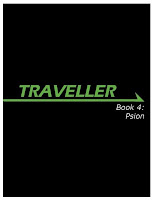
Mongoose Traveller Book 4: Psion
By Lawrence Whitaker
I never used to be completely comfortable with the idea of Psionic abilities in Traveller. Consequently I never allowed them in my games. This is probably due to two reasons; firstly, while I like the concept of teleportation, psionic healing, telekinesis, etc, I don’t tend to think about psionic abilities naturally and so the sudden advent of a Psion is likely to grossly unbalance my game; and secondly, the Psionic rules in Classic Traveller’s Book 3: Worlds and Adventure and Mongoose Traveller’s Core Rule Book are very basic and, to me, rather uninspiring. Even the addition of a Psion Character career in Mongoose Traveller added little to what had been already written in both sets of rules, though it now becomes possible to sketch out Zhodani characters or NPCs.
With Mongoose Traveller’s Book 4: Psion, all my preconceptions have been turned on their heads, and I now want to actively encourage Psionic Characters in my RimWorlds campaign. Psion is pitched to a wider audience than that of the straight Traveller player, and draws inspiration from Science Fiction, Science Fantasy and Space Opera. This leads to an influx of fresh ideas and a general new look at Psions and Psionics, how they work and what they do, that hasn’t really happened with Traveller’s Psionics since the days of the Little Black Books.
While some of the concepts may fall far outside the traditional style of Traveller game, it is possible to draw inspiration from them and I can easily see myself running a very ‘X-Files-like’ game where Psionic characters know or learn things about the universe that conventional characters will never know.
This is a Mongoose Traveller supplement that I will have to get an actual copy of, rather than relying on a pdf.




































.png)










Psionics are an odd duck. I have used them in the past in other scifi games. I don't play Traveller, but I have played in other "hard scifi" settings and managed to use them to good effect. For me it all comes down to portraying them, as much as possible, as natural abilities that are scientifically explanable instead of something fantastic like magic.
ReplyDeleteAgreed. The temptation is to treat psionics as 'magic', which is also why I've been a little uncomfortable with using them 'in-game'. So it was very refreshing to read such an in-depth book about the positives and negatives of psionic use which fitted neatly together and made sense!
ReplyDeleteI tend to use the term ESPer instead of Psion. As an acronym for Extra Sensory Perception, it just sounds more technical and scientific.
ReplyDeleteThat's interesting. I recall ESPer as either an Andre Norton type term (and so dating from the late 50s or 60s - though I didn't read the books until the late 70s or 80s) or a TV Science Fiction term from the 1970s - ('The Tomorrow People' from the UK - still remember the slightly scarey opening titles and the villain, Jedikiah). I get hung on the 'Sensory Perception' part of ESP though, which, by implication, rules out TK and TP.
ReplyDeletePsion, to me, sounds slightly mysterious and a better fit for the broader Psionic powers. I don't recall the term 'Psion' prior to T4 Traveller, though.
Funny how we just get different feels from the same words.
When I use ESPer its usually has its roots in the early days of psionic research when it was mainly sensory powers - ESP, precognition, remote viewing, etc.
ReplyDeleteThe way I write it is that the term has been maintained but it's meaning broadened. This is somethign we see a lot in our own world - words being allowed a broader meaning than originally intended.